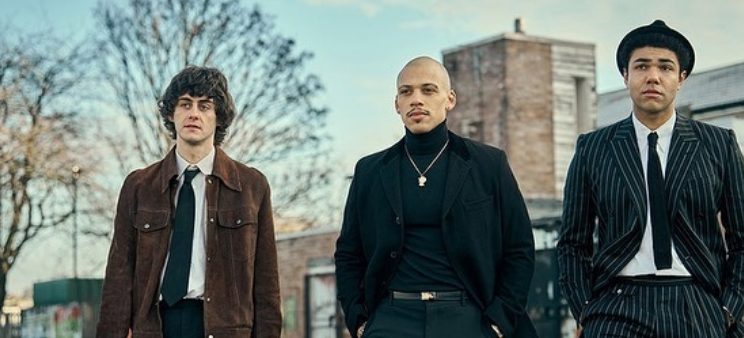
TV writer Toby Jarvis reviews Steven Knight’s new Midlands-based BBC show: This Town, with great production and a stellar cast let down by a few too many sub-plots.
Our hero, Dante, is a poet. This we know from episode one, largely because he gives it a cheeky mention roughly every nineteen femtoseconds as he meanders about the Thatcher-era West Midlands. Across This Town, the new BBC series helmed by Steven Knight (Peaky Blinders), he is to undertake a metamorphosis into a lovable, huggable bastard child of Bob Dylan and Terry Hall, although it does take some getting there.
The most immediate assumption you as a viewer are liable to make is that the show will be largely preoccupied with the creation of Dante’s band – how they meet, how they write, how they fall out and reconcile – and indeed there is a fair whack of this. In practice, however, all four million of Knight’s subplots (most of them non-band related) are vying for a collective six hours of screen time, which means the bulk of the nitty-gritty music-ing comes in the last twenty minutes or so. A lot of the advertising material has been fixated with the notion of music bringing people together: not just Dante and his Irish cousin Bardon, whose dad is trying desperately to conscribe him into the IRA’s ‘Bring Your Child To Work’ day, but also their parents, their classmates, their heroin-addicted peripheral bandmate, and of course the British Army.
Besides ‘the unifying power of music’ sounding like every single Eurovision slogan … the main issue This Town runs into is this sheer scope
Besides ‘the unifying power of music’ sounding like every single Eurovision slogan ran through a broken tumble dryer, the main issue This Town runs into is this sheer scope. There are a few recurring interests of Knight’s popping up here: a nascent IRA appears in the later outings of Peaky Blinders as its Troubles iteration does in This Town, for example; the Birmingham crime boss built like a pipe cleaner is very Tommy Shelby adjacent too. It is surely better to have a surplus of ideas than a deficit but this does inevitably beget a lack of focus. More so than music, what unifies all Knight’s themes and subplots is the wonderful production design; This Town’s real protagonist is concrete.
Back to the Ra, then. A sentence like that out of context is liable to get me on a list, but given the show gradually becomes more interested in that than Dante’s band it’s a risk I’ll have to take. The central intrigue driving each episode is increasingly Bardon’s struggle to escape a part-time role as head ringer-of-phones for Dad’s weird mates from work – by the time we’re at episode six, the camera has followed him out of the Midlands entirely and down to London as part of another errand. My main thought while watching (besides “I didn’t realise the IRA had such a massive problem with nepotism”) was that there existed a pretty massive trench between the stakes of this and what is ostensibly the primary narrative.
the Coventry and Birmingham of a decade gone by is surely so well realised here on account of his personal love of the area
This has the nasty side effect of making Dante’s creative struggles seem slightly inconsequential or even irritating by comparison. “Good grief, my dad’s only gone and made me dial in another bomb threat” is probably, in the grand scheme of things, a bigger deal than “my Specials tribute band isn’t coming along as quickly as I necessarily would have liked.” This is to say nothing of the tangents into alcoholism, racism entrenched within the police, the rollback of worker’s rights under Thatcher, and of course the plague of double denim in the 1980s. There is a certain earnestness to Knight’s scripts that unifies every theme in the absence of other commonalities – the Coventry and Birmingham of a decade gone by is surely so well realised here on account of his personal love of the area – and the Sutton Coldfield-bashing does not go unappreciated.
Luckily, a strong cast is here to carry us through the screenplays’ worst excesses
Some of the dialogue does teeter terrifyingly close to stiltedness. By the time one character says “I betrayed another man with a kiss” you’re not even done mockingly saying “like Judas” to yourself before he’s actually done it. Luckily, a strong cast is here to carry us through the screenplays’ worst excesses (of which there aren’t actually that many – I’m just being mean) – particular standouts for me were Levi Brown and Michelle Dockery, though there is not a weak link among any of them. Some seem almost underutilised: David Dawson is here all too briefly, having made a full recovery from appearing alongside Harry Styles in 2022’s My Policeman.
Six episodes does not feel like enough for the volume of ideas raised by Knight. He seems all too aware of this; there are a great many subplots (to add to the pile) cheekily gestured at in the finale, and a second series would provide an excellent way for him to give his testament to the Midlands some breathing room. As it stands, This Town is an engaging but frustratingly disjointed drama that would surely benefit from more room to expand on its themes.
Rating: 3/5
Read more TV articles here:

Comments